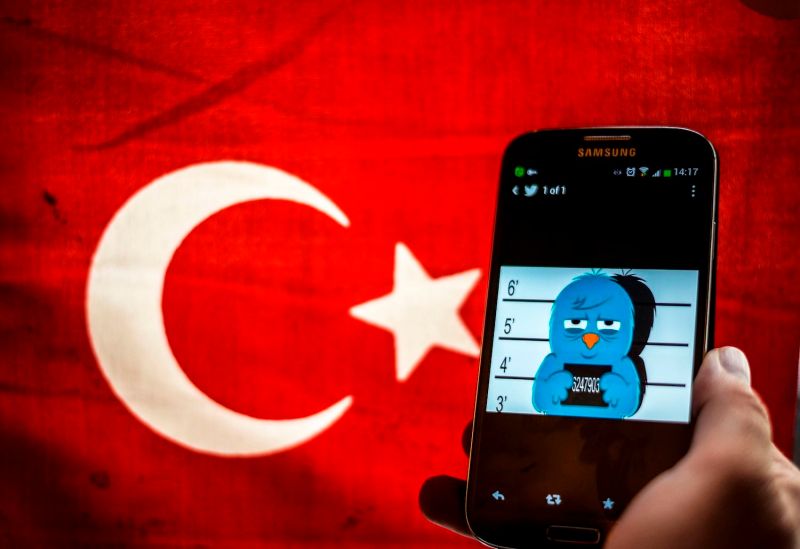A picture representing a mug shot of the Twitter bird is seen on a smartphone in front of a Turkish flag in Istanbul on March 26, 2014. OZAN KOSE/AFP/GETTY IMAGES
Anxious about its failure to establish cultural hegemony, the Erdogan government is going after internet stars.
While Turkey has been no stranger to judicial scandals in recent years, Pucca’s harsh sentence still managed to raise eyebrows. Many commentators, including Pucca herself, decried the absurdity of the sentence, noting that rapists and perpetrators of other serious crimes regularly go unpunished. Some social media followers have speculated that the prison sentence was meant as retribution for the influencer’s support of the opposition politician Muharrem Ince, who ran against President Recep Tayyip Erdogan last year for the country’s top office. If that is true, the verdict against Pucca, who has nearly 2 million followers on Twitter and 677,000 on Instagram, sends a chilling message to social media celebrities: Don’t use your influence against the government.
“Turkey’s secular celebrities, especially performance artists in theater and cinema, have long been major critics of Erdogan—often appearing in music videos and television commercials aimed at political resistance,” said Merve Tahiroglu, a research analyst at the Foundation for Defense of Democracies. “The Turkish government has grown increasingly intolerant towards these figures since the [2013] Gezi protests, when many prominent artists joined the nationwide anti-government demonstrations.”
Indeed, Pucca is far from the first celebrity who has rankled this government. In 2016, former Miss Turkey winner Merve Buyuksarac was convicted on charges of insulting the president due to a poem she shared on her Instagram account. She was handed a 14-month suspended prison sentence. The actor Memet Ali Alabora has likewise faced trouble since he tweeted in support of the Gezi protests. In late 2018, the government issued an arrest warrant for Alabora, who resides in exile in the United Kingdom and is currently being tried as one of the key suspects in a case relating to the protests. And last year, the popular rapper Ezhel, whose legal name is Omer Sercan Ipekcioglu, was jailed and brought to trial on the same charges as Pucca. In Ezhel’s breakout video, which has been viewed more than 67 million times on YouTube, Ezhel is seen brandishing a soccer scarf bearing the faces of several men who were killed by police during the Gezi Park protests and who have since become icons of resistance. He was acquitted, but not before spending nearly a month behind bars. The rapper was exonerated for the second time on those charges in a separate trial this year.
Part of the reason for this wave of pressure is the growing importance of online news sites, social media, and YouTube, which have become the primary means of accessing news and content for millions of people in Turkey who have become fed up with the handful of established newspapers that often bear the same headline word for word. Talking heads on television sound more like government spokespeople than journalists.
“Erdogan keenly understands the need to control information to preserve his power,” Tahiroglu noted. “He secured this control in print and broadcast media and has attempted to regulate social media by banning Wikipedia, YouTube, Twitter, and intervening against popular blogs like Eksi Sozluk.” In turn, Turkey, she pointed out, is “not only the world’s worst jailer of journalists but also has a dismal record in internet freedom.”
The targeting of critical celebrities is also likely linked to the government’s insecurities about its failure to establish cultural hegemony in Turkey, Tahiroglu said, pointing to a quote from Erdogan in 2017, where the president expressed regret over his government’s problems with “ruling the cultural and social field.” After all, two decades into his rule, “Erdogan controls nearly all state and government institutions. But his cultural model for Turkey still doesn’t resonate with at least half of the country’s electorate.”
This year, the president again voiced his concern for the government’s lack of progress in culture and the arts—presumably meaning conservative and pro-Erdogan works—and vowed to invest in them. The best investment, however, may be addressing the atmosphere of repression in which artists often resort to self-censorship. Nevertheless, the cultural sphere cannot be controlled from the top down. On the contrary, the influence and popularity of people like Pucca are based on an organic demand for original content curated by individuals with a distinct voice and bolstered by social media.
Shortly after the news of Pucca’s sentencing broke, D&R, a nationwide chain of shops that was sold last year to the pro-government Turkuvaz Media Group, canceled a book signing for Pucca it was due to host in the Aegean seaside town of Cesme. Pucca rescheduled the signing with the Kirmizi Kedi bookstore, a chain and publishing house that is friendly to the opposition. During the event, she shared a video on her Instagram of a line of fans stretching well out the door, an indication that, if anything, the prison sentence may have actually helped her career.
Ezhel, whose arrest prompted public outcry and a wave of support on social media calling for his release, was acquitted in both of the cases against him. The similar reaction to Pucca’s sentencing may result in a higher court overturning the ruling, an indication that such backlash can lead to the government opting to back down. Notwithstanding, the possibility of spending years in jail for tweeting the wrong thing remains a legitimate concern in today’s Turkey.
By Paul Osterlund
Source: Foreign Policy



